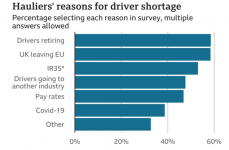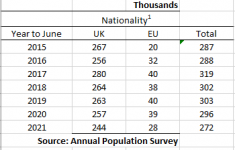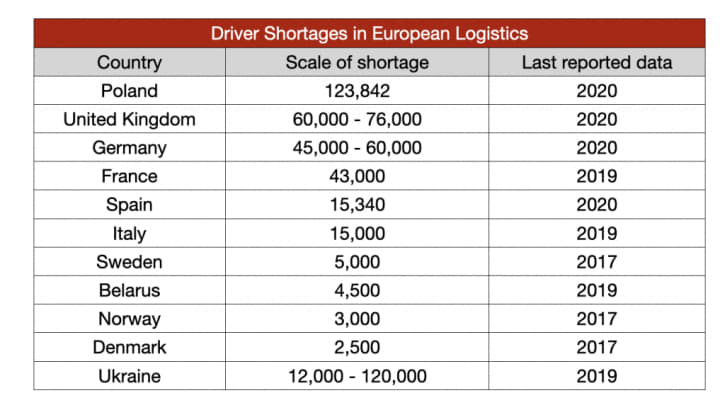Not sure why I am bothering Andy, but looking just at ONS data UK and EU drivers increased up until 2017, as did the total driver workforce, as you would expect.
Since 2017 BOTH UK drivers and EU drivers have left the industry. You say UK drivers left for one reason and EU drivers left for another, stating how the UK workforce was better educated than the Eu drivers and that was the reason tfor the UK driver fall off. The you argue that a potential UK driver will have higher aspirations than a Polish driver..
The data shows a drop off for both data sets, but you think its for different reasons, is that right? Because if it is there is no point having the discussion. The data doesn't say that, that is your interpretation based on your viewpoint.
From the cnbc article, which I have no idea of its veracity or if the quotes are taken out of context:
The U.K. is not alone when it comes to driver shortages, however, and experts warn that parts of Continental Europe could also face their own trucker shortfalls soon enough.
"We're not in as dramatic and desperate situation yet, but it might come," Frank Huster, director general at the Federal Association for Freight Forwarding and Logistics Germany, told CNBC on Thursday.
He noted that while Brexit has "certainly had an impact" on the U.K., the wider European haulage sector faced a long-standing problem with a lack of workers.
"The logistics sector lacks qualified personnel such as lorry drivers but also trained locomotive drivers, inland navigation workers, terminal workers, as well as management people. ... We have less and less people to work in Western markets," he added.
Analysis company Transport Intelligence published research in August looking at
"European Driver Shortages" in which it assessed the severity of the shortfalls in various European countries, a problem it said had been growing over recent years. It estimated that across Europe the total shortfall of drivers now surpasses 400,000, with the most heavily impacted
European countries being Poland, the U.K. and Germany.
Transport Intelligence's research looked at driver shortages across Europe
Transport Intelligence
John Manners-Bell, CEO of Transport Intelligence and an expert on global supply chains and logistics,
said that the industry has been warning governments of shortages for many years.
In an editorial last week he said that "disruption to supply, rising prices, reports of empty shelves and – most recently – the fuel crisis, have shone a spotlight on the industry. Long-term structural problems have been laid bare by a perfect storm of post-Covid demand volatility, infrastructure failings, bureaucracy, Brexit and dismal pay and conditions."
"Factors such as delays to HGV testing; inefficiency in processing licenses; an ageing workforce and insufficient numbers of new recruits, due to working conditions and image issues of the profession, have been plaguing the industry for many years," he added.
Manners-Bell said he hoped the current crisis would bring about positive changes in the industry, noting that "it is time that all stakeholders in the sector – industry associations, the government, operators and shippers – throw their support behind plans to make road freight transport fit for purpose as a driver for sustainable economic growth."

www.cnbc.com

/cloudfront-us-east-2.images.arcpublishing.com/reuters/O56VLV2HXJPWBL42ZAGIVLD2EA.jpg)


